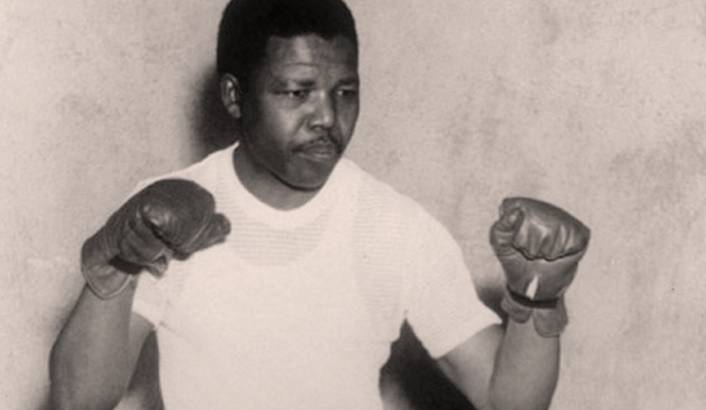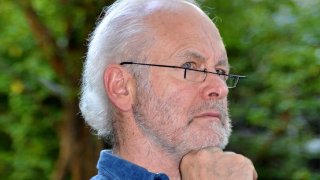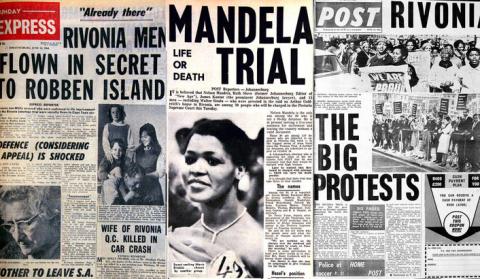- Nelson Mandela: The evolution of a freedom fighter - The slow development of the young Nelson Mandela towards political consciousness
- Mandela on trial: The ethical core - Mandela puts apartheid on trial, 1962 and Rivonia trials
Nelson Mandela: The Evolution of a Freedom Fighter
, A
by Raymond Suttner
December 9, 2013
Daily Maverick (South Africa)

(credit - Daily Maverick)
"I was not born with a hunger to be free," Nelson Mandela writes in his autobiography. He immediately explains, "I was born free - free in every way that I could know. Free to run in the fields near my mother's hut, free to swim in the clear stream that ran through my village, free to roast mealies under the stars and ride the broad backs of slow-moving bulls. As long as I obeyed my father and abided by the customs of my tribe, I was not troubled by the laws of man or God."
This is part of his reflection and frank assessment of how his life unfolded. Like all of us, Mandela was free in every way that was within his imagination or visible in the world he inhabited. And he immediately describes the places where he exercised his freedoms. He admits that he did not immediately comprehend the world beyond what he saw and understood it to comprise and mean.
There was nothing inevitable about Nelson Mandela becoming a freedom fighter. In his early life he was groomed to be a counsellor to the future Thembu king, Sabata Dalindyebo. When Mandela attended Clarkebury, Healdtown and Fort Hare it was not to develop his own leadership qualities, but to equip him to prepare Sabata for leadership. During this period Mandela generally did not recognise white oppression and when he did, was unwilling to resist. This was not cowardice but, I believe, he acted as he thought his guardian, the regent Jongintaba Dalindyebo, expected of him.
At this point, Mandela's consciousness of himself is as a Thembu and to some extent as part of a broader range of Xhosa-speakers. It is only when he arrives on the Witwatersrand in 1941 at the age of 23, escaping a marriage arranged for him by the regent, that he starts to develop a broader consciousness of himself as an African and to recognise more fully the all-encompassing oppression of black people and Africans in particular.
In this context, the influence of Walter Sisulu is crucial, not only politically, but also in helping him to become an attorney, something Mandela valued very greatly. Mandela came under the influence of a number of young ANC activists and also Communists. He formed close relationships with Indian and white radicals, especially at Wits University. When he made his initial political choices, he believed that Africans should go it alone. That was the political direction of the Youth League (YL) founded in 1944 under the leadership of Anton Lembede, Mandela, OR Tambo, Sisulu and AP Mda.
Even though Mandela witnessed bravery and dedication of people of all population groups, many of whom were Communists, of the YL leaders, he was possibly the most hostile to any form of cooperation and notorious for breaking up meetings of the other organisations.
The YL was determined to transform the ANC from what they saw as indecision and timidity into a mass organisation. At the 1949 ANC conference they succeeded in having the `mother body' adopt their Programme of Action. Sisulu was elected Secretary General. This inaugurated the period where the ANC emerged as a hegemonic African nationalist organisation, notably during the Defiance campaign of 1952, with Mandela as volunteer in chief.
But the 1950s was a time of intensified oppression under National Party rule. In much of that period, Mandela and other leaders were restricted, but continued to operate clandestinely. In this phase Mandela carried a range of influences within himself. His dedication to the struggle was manifested with a similar focus to that which he learnt from boxing, a "monastic type discipline". The young man, who grew up expecting little from life beyond being a champion stick fighter, realised over time that there was "more that the world held in store for me". He gradually became a man, who, with his comrades, would change that world.
Under Mandela's leadership the ANC prepared for future banning by developing what was known as the M-plan, organising small cells. Mandela and Sisulu, amongst others, held initial discussions on armed struggle, long before MK was formed.
The nationalism the ANC propounded in the 1950s together with allied organisations in the Congress alliance became a popular multi-racial and multi-class nationalism, speaking for all "the people" of South Africa.
The aspirations of this broadly based movement included a non-racial future, enunciated in the 1955 Freedom Charter's declaration that South Africa "belongs to all who live in it, black and white".
That Mandela became a leading proponent of the Charter illustrates his openness, his willingness to change and develop his ideas when found to be inadequate.
In this period Mandela's commitment to the freedom struggle becomes almost all-consuming. The child born without a hunger for freedom has become a freedom fighter. He continually grows in understanding of Apartheid oppression and developed an insatiable hunger for freedom - his and ours.
Mandela on Trial: The Ethical Core
by Raymond Suttner
December 9, 2013
Daily Maverick (South Africa)
When Mandela was captured in 1962 the police did not know that he had been overseas for military training and that he was Commander in Chief of the recently formed Umkhonto we Sizwe, Spear of the nation, (MK). It was only later, when Rivonia was raided that they came across documents that pointed to Mandela's wider role. When Mandela appeared in court in 1962, he was defiant. As he entered he wore the attire of the abaThembu, thus asserting that he was not only a lawyer, an African, a believer in a South Africa that belonged to all who live in it, but also a Thembu.
Bearing relevance to the present, he was asserting that these identities can coexist and that it is not backward or primitive to continue to identify oneself as a Thembu, and understanding such an identity do exist in a dynamic relationship to the broader freedoms and identities of others.
Mandela immediately took charge of the courtroom, asking the magistrate to allow him to make a request that went beyond the charges he faced. It was in itself presumptuous for an accused to make a demand to bypass the charges that were before the court. In law, no accused can do that. But more was to come. For the first time in South African history a person demanded not only recusal of the magistrate but did so because he - as a "black man in a white man's court" - did not recognise the laws under which he was tried.
These were laws made by whites and they were made to oppress black people. Mandela argued that the entire court room was suffused with the imagery of whiteness, white power - white police, a white magistrate, a white prosecutor, white court orderlies and this was the character of the justice system as a whole. He believed he could not secure justice in that situation.
His plea was refused and Mandela proceeded to conduct his own defence, which amounted to a political statement, putting the government on trial for creating the situation where black people were forced to resist in order to regain their human dignity. Found guilty, Mandela presented a `plea in mitigation of sentence', that constituted a defence of his actions, depicted as part of the centuries long resistance to conquest. On that occasion Mandela was sentenced to five years.
He was hauled back, from Robben Island, to face charges in the Rivonia trial of 1964. The accused were charged with a general conspiracy to overthrow the state. Their demeanour was defiant. When asked to plea they responded, "not guilty, the government should be in the dock".
A close reading of Mandela's statement from the dock reveals a man who traced the process leading to his trial back to the young boy, the stick fighter of his youth, who listened to stories of brave warriors resisting conquest. He explains systematically what led him (and his comrades) to be on trial.
Mandela speaks of the choices he made. Having undergone considerable development in his understanding, the Mandela who stands trial is a man who sees his life inextricably tied to the plight of all the peoples of South Africa, black and white. He respects their common humanity and there can be no half-measures in the struggle for their freedom.
When Mandela made this statement, the death penalty was a real possibility facing the accused. Mandela came from a very different generation from those who entered the ANC after 1990 when danger had passed, to a large extent and quite different prospects could open up if one entered leadership.
Mandela makes it clear that willingness to sacrifice meant being prepared. One could not say one is ready to die without visualising what it entails to carry out such an undertaking. In this respect Mandela bears comparison with Mahatma Gandhi and Chief Albert Luthuli who also prepared themselves for the possibility of death, placing a lot of weight on vows and other undertakings to face whatever the future might hold.
To be ready to carry out one's undertakings in extreme situations entails more than political understanding or belief in a cause. It also means unifying one's thinking and one's psychological or spiritual willingness to make this integral to one's life and possible death.
Amongst the legacies of Mandela is this ethical core, this sense that acting on beliefs was not merely enunciation of ideas, but preparation for and willingness to endure hardships of an extreme kind. It is possible that some who read this will say that is for Mandela not for us ordinary mortals. But all of us, in our everyday lives confront difficult decisions and we have to decide whether or not we act in accordance with the beliefs we claim to cherish. It is this unifying of thinking and acting that we need to try to incorporate into our personal and political life.

[Raymond Suttner worked with Nelson Mandela when he was first released from prison. He is a former political prisoner, underground operative and leader in the ANC, SACP and UDF. Currently he is a professor attached to Rhodes University and UNISA. Suttner's blog posts can be found at http://raymondsuttner.com/ . His email address is rsuttner@worldonline.co.za.]


Spread the word